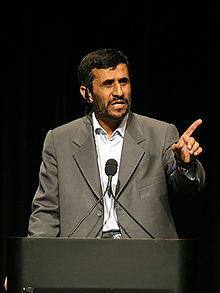OK, the president of Iran was not actually out in the street directing cars, but the interruption of traffic-flow did have to
 |
"Road's blocked. Turn that way." |
| A |
do with him. The pronouncements of the hot-headed public face of Iran's intransigent government are one factor in the rise in global oil prices. The US government, in an attempt to get individuals and industry to use alternative sources of energy, is offering various incentives for conversion to "Green" technologies. Our local industry--a paper/chemical company decided that it would take advantage of these tax-breaks, etc. and is currently building a bio-mass boiler--more or less a huge wood-burning stove, which is part of its effort to become energy self-sufficient (which is something else to think about). Since property around the mill is limited, they are taking advantage of a vacant (unoccupied because of other global influences) industrial site just down the road from Covington Bible, and this morning several over-sized components of the project were making their way to this lay down area. As I chatted for a moment with the cop who was directing traffic, a friend of mine, I thought I felt the breeze from a butterfly's wing. We live in a world of incredible complexity and inter-relatedness.
Just recently I met with a group of people who want to deal responsibly with a potential issue, should it materialize. All of us have the same zip code, yet we were dealing with concerns that involve complex international relat

ions, U. S. national politics, complicated matters of ethics in regard to church and state, and a the result of several hundred years of history.
Who'd a thunk it?
Here is the encouraging, other side.
I can't think of a time--leaving out Adam & Noah--when one person, or one small group has had greater opportunity to influence the world than right now. This email message will be read round the world, including some folk who could drive to Ahmadinejad's neighborhood--that is if he doesn't have the road blocked there on account of something that is going on here. Over the past month people in my little circle have visited Brazil, Asia, Central America, the Pacific Islands, and I'm probably missing some place. Across the hall, my associate spends a couple of days most weeks translating the Bible into a language that most of you have never heard spoken, for people that most of you will never meet. Last night our CBC Sunday Nite group chatted in real time, video included, with colleagues who live where it was already the middle of today.
This morning the road out front was blocked because of something going on eight-and-a-half time zones away. There has never been a time when the road has been more open for the Good News to penetrate every time zone around the world.
"Go therefore and make disciples of all the nations." (Matthew 28:19)

